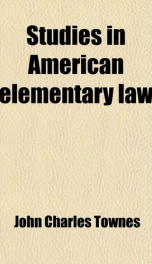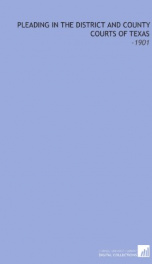studies in american elementary law

Purchase of this book includes free trial access to www.million-books.com where you can read more than a million books for free. This is an OCR edition with typos. Excerpt from book: Federal State might become physically and practically able to disregard the compact among the several States which gave it being, but that morally it is bound not to do so, and legally should not do so. Within the sphere of its political authority a Federal State acts directly upon its citizens as individuals and not indirectly through the States. This is in sharp contrast with the impotency of a Confederation in this respect. As a Federal State is invested with sovereign power as to certain matters, and is practically the chosen representative of all of the several States creating it, the responsibility of preserving and exercising these sovereign prerogatives rests upon it and it must protect them to the extent of its ability from attacks ,by other nations and against encroachments and withdrawals iby the several States. By entering into being and entering upon the'discharge of the functions assigned it, it becomes the agent of all the States constituting it to carry out the will of all as expressed and embodied in the creative act, and1 it is its solemn duty to meet this responsibility. It is apparent that the conception of a Federal State carries with it of necessity the idea of dual sovereignty, that is, of two sovereign powers, each 'operating within the same territory and upon the same people but each restricted as to the political and legal matters over which it has jurisdiction. To deny this conception is to deny the possibility of the existence of a Federal State. Where the-'line of separation between the two jurisdictions shall be depends, necessarily, upon the original agreement of the Unitary States entering into the Federation. So much of sovereign power and prerogative as is conferred upon the Federal State is to be determined by a fair and honest interpret...
Info about the book
Author:
Series:
Unknown
ASIN:
B008GPRZPO
Rating:
3.5/5 (4)Your rating:
0/5
Languge:
English
Users who have this book
Users who want this book
What readers are saying
What do you think? Write your own comment on this book!
write a commentGenre
if you like studies in american elementary law try:
Other books by this author
Do you want to exchange books? It’s EASY!
Get registered and find other users who want to give their favourite books to good hands!



